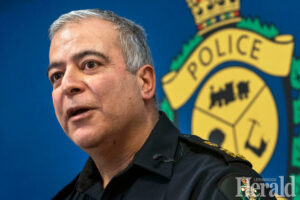Lethbridge Police Chief welcomes ban on carding
By Lethbridge Herald on November 19, 2020.
 Lethbridge Police Chief Shahin Mehdizadeh speaks with reporters Thursday after the province announced an immediate ban on the practice of carding. Herald photo by Ian Martens @IMartensHerald
Lethbridge Police Chief Shahin Mehdizadeh speaks with reporters Thursday after the province announced an immediate ban on the practice of carding. Herald photo by Ian Martens @IMartensHeraldDale Woodard
Lethbridge Herald
A change in police standards was handed down Thursday afternoon by the Alberta government.
Effective immediately, the province is banning carding and establishing clear rules for common interactions between police and the public to ensure the rights of Albertans are protected.
The changes to provincial policing standards ban police in Alberta from randomly and arbitrarily stopping members of the public and asking for personal information — a practice known as carding.
The new provisions also establish clear rules for other common encounters — known as street checks — to ensure police officers respect the rights of citizens when requesting personal information.
The government is moving swiftly in response to concerns carding and street checks disproportionately target members of racialized and marginalized communities.
Speaking at a press conference Thursday afternoon at the Lethbridge Police Service headquarters, Police Chief Shahin Mehdizadeh said the LPS supports the government’s announcement in relation to street checks.
“From my perspective, what it’s going to do is pave the path for the police departments to work in better partnership, and a trusting relationship, with the community to make sure we serve every citizen with the level of respect they deserve and the citizens feel that way, too,” said Mehdizadeh.
Lethbridge Police have been reviewing a policy since 2018 which is similar to what the government has announced on Thursday, said Mehdizadeh.
“Over the last couple of years we have done a lot of movement in relation to making sure we’re policing based on 2020 standards, really modernizing that and we’ll continue to look at those policies.
“We like to review these policies every year just to make sure we continue to stay relevant with the progression of society and the expectations of our communities. I can share with you that our policies today are not much different. But we’ll have another look to make sure they are absolutely mirroring what province is providing.”
As for carding issues in Lethbridge the past, Mehdizadeh — who was sworn in as Chief of Police on Sept. 1 — preferred to look forward.
“Anyone who has talked to me before, I don’t look at the past,” he said. “If there have been problems in the past obviously it’s not going to be the way of future for Lethbridge Police Service. As an immigrant myself and somebody who came to this country, I see the value of making sure every citizen gets the respect they deserve.
“This announcement paves the path for not only Lethbridge Police, but every police department in the province to make sure those practices are stopped.
“Bringing policy and legislation is great. It’s about making sure we adhere to them and also hold people accountable when they are not doing so. That is the most important part from Lethbridge Police standards, we will continue to monitor the situation to make sure all of our officers and employees have full respect for every citizen here and those who are not will be held accountable.”
Follow @DWoodardHerald on Twitter
-1

